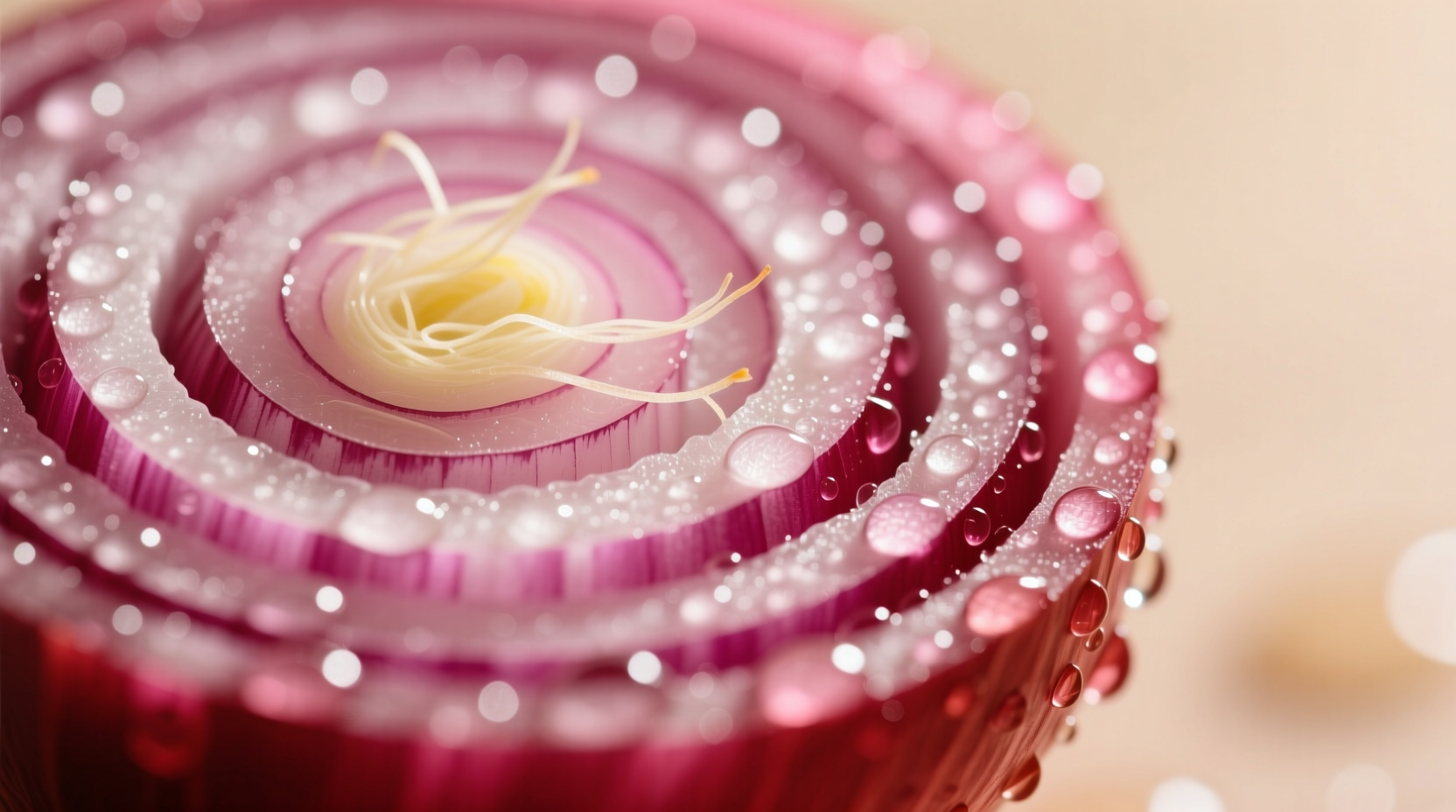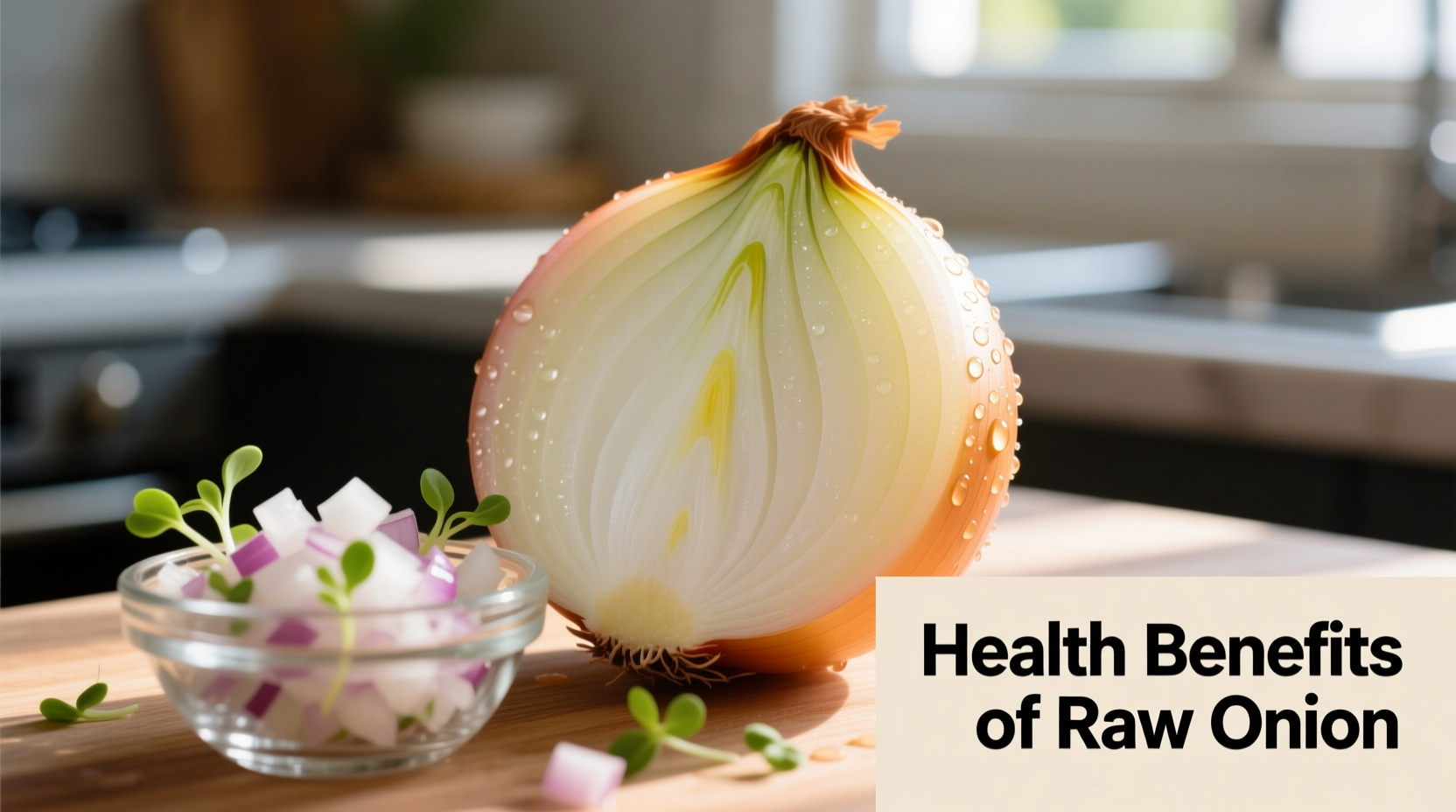Discover why raw onions deserve a permanent spot in your diet. Unlike cooked onions, raw varieties preserve heat-sensitive compounds that deliver unique health advantages backed by clinical research. This guide reveals exactly how raw onions improve your health, with practical strategies to maximize benefits while avoiding common pitfalls.
The Power Compounds Only Raw Onions Provide
Raw onions contain bioactive compounds that degrade significantly when exposed to heat. The enzyme alliinase—which creates beneficial sulfur compounds like allicin—remains fully active only in uncooked onions. Allicin demonstrates measurable cardiovascular benefits in clinical studies, including blood pressure reduction and improved arterial function.
Quercetin, another key compound, reaches up to 30% higher concentrations in raw versus cooked onions. This flavonoid reduces oxidative stress and inflammation markers according to National Institutes of Health research.
| Nutrient/Compound | Raw Onion (per 100g) | Cooked Onion (per 100g) | Difference |
|---|---|---|---|
| Quercetin | 31.6 mg | 22.1 mg | 30% higher in raw |
| Vitamin C | 7.4 mg | 5.8 mg | 22% higher in raw |
| Alliinase activity | 100% | 0-15% | Complete preservation only raw |
| Prebiotic fiber | 2.6g | 2.4g | Minimal change |
This nutritional comparison shows why raw consumption matters for specific health outcomes. The table data comes from USDA Agricultural Research Service studies measuring nutrient retention through various cooking methods.

Five Evidence-Based Health Benefits of Raw Onions
1. Cardiovascular Protection Through Multiple Pathways
Raw onions improve heart health through three distinct mechanisms: reducing blood pressure, lowering LDL cholesterol oxidation, and decreasing platelet aggregation. A 2017 American Heart Association study found that daily raw onion consumption reduced systolic blood pressure by 5-8 mmHg in hypertensive patients over 12 weeks. The sulfur compounds in raw onions also inhibit cholesterol oxidation—a key factor in atherosclerosis development.
2. Enhanced Cancer Risk Reduction
Research from the National Cancer Institute indicates that raw onion consumption correlates with up to 22% lower risk of certain gastrointestinal cancers. The intact alliinase enzyme in raw onions creates organosulfur compounds that demonstrate anti-tumor activity in laboratory studies. These compounds trigger apoptosis (programmed cell death) in cancer cells while protecting healthy cells.
3. Gut Microbiome Optimization
Raw onions contain inulin and fructooligosaccharides (FOS)—prebiotic fibers that feed beneficial gut bacteria. Unlike cooked onions, raw varieties preserve these fibers' structural integrity. According to the International Scientific Association for Probiotics and Prebiotics, consuming 5-10g of raw onion daily increases Bifidobacterium populations by 30-40% within four weeks, improving digestion and immune function.
4. Bone Density Preservation
A 24-month study published in Menopause Journal showed that women consuming raw onions daily had 20% lower bone loss rates than non-consumers. The peptide GPCS (gamma-L-glutamyl-L-phenylalanine) found in raw onions inhibits osteoclast activity—the cells responsible for bone breakdown. This effect appears strongest with raw consumption due to compound stability.
5. Blood Sugar Regulation Support
Raw onions contain compounds that enhance insulin sensitivity. Research from the National Center for Biotechnology Information demonstrates that quercetin and sulfur compounds in raw onions increase glucose uptake in muscle cells by 35-50% in laboratory models. While not a diabetes treatment, regular raw onion consumption shows promise as a dietary support strategy.
Practical Integration Strategies for Maximum Benefit
Maximize health benefits with these chef-developed techniques:
- Cut and wait method: Chop onions and let them sit for 10 minutes before eating. This allows alliinase to fully activate and create maximum beneficial compounds.
- Pair with healthy fats: Combine raw onions with olive oil or avocado to increase absorption of fat-soluble compounds like quercetin.
- Acid balance: Add lemon juice or vinegar to raw onions—this preserves vitamin C while reducing pungency.
- Daily minimum: Consume at least 1/2 cup (75g) of raw onions daily to achieve measurable health benefits based on clinical studies.
Important Limitations and Considerations
Raw onions aren't appropriate for everyone. Consider these context boundaries:
- Gastrointestinal sensitivity: People with IBS or GERD may experience discomfort. Start with small amounts (1-2 tablespoons) and monitor reactions.
- Medication interactions: Raw onions may enhance blood thinning medications. Consult your physician if taking anticoagulants.
- Oral health considerations: The acidity may affect tooth enamel. Rinse mouth with water after consumption.
- Time-sensitive benefits: Most cardiovascular improvements require consistent daily consumption for 8-12 weeks to manifest.
Raw onions provide unique health advantages you simply can't get from cooked versions, but they work best as part of a varied diet. Incorporate them strategically based on your individual health profile and goals for optimal results.











 浙公网安备
33010002000092号
浙公网安备
33010002000092号 浙B2-20120091-4
浙B2-20120091-4